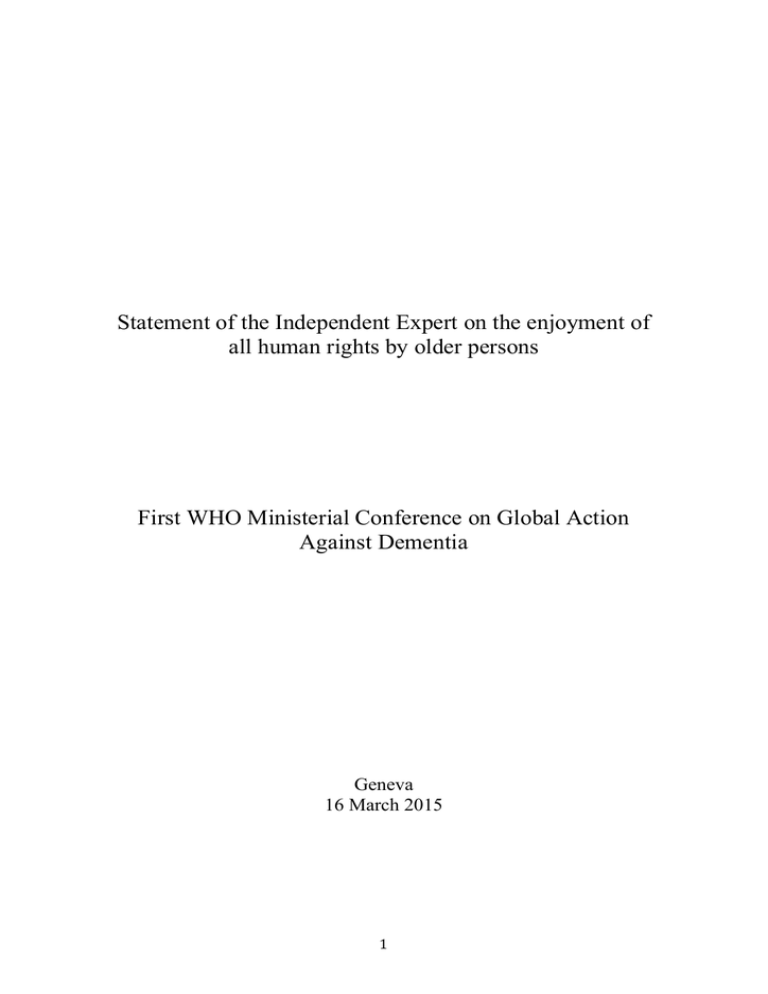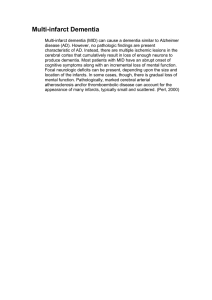Document 17683103
advertisement

Statement of the Independent Expert on the enjoyment of all human rights by older persons First WHO Ministerial Conference on Global Action Against Dementia Geneva 16 March 2015 1 Excellencies, Ladies and Gentlemen, As the first United Nations Independent Expert on the enjoyment of all human rights by older persons, I feel extremely honoured to address you on the occasion of the First WHO Ministerial Conference on Global Action Against Dementia. I am pleased to share this Panel with so prominent experts from diverse backgrounds and grateful for the opportunity to share with you some reflections regarding the importance of adopting a human rights based approach when addressing the issue of dementia. The rights and needs of persons with dementia have been given low priority in the national and global agenda. In particular, with the progression of the disease, as their autonomy decreases, persons with dementia tend to be isolated, excluded and subject to abuse and violence. It is therefore crucial to address dementia through a human rights-based approach because persons with dementia are rights-holders and States and other stakeholders are duty-bearers with correlative obligations based on international human rights standards and principles. Under a human rights based approach, the development of policies, legislation, regulation, institutions and budgets related to dementia risk reduction and care should be anchored in a system of rights and corresponding obligations that States have agreed to comply with under the international human rights framework. Although there is no universal recipe, the acronym “PANEL+” could guide us to development appropriate measures with a view to achieving the effective and full realization of the human rights of persons with dementia in care or any other circumstance. PANEL+ means: - Participation: means that all persons with dementia are entitled to active, free and meaningful participation in, contribution to, and enjoyment of civil, political, economic, social and cultural life. Persons with dementia must remain integrated and included in society, and participate actively in the formulation and implementation of policies that directly affect their wellbeing. Their voice and choice should be heard. Participation also includes Accessibility. They should have access to information and care that will help to them to maintain and regain their wellbeing and to prevent or delay the progression of the disease. - Accountability: means that States and other duty-bearers are answerable for the realization of human rights of persons with dementia. In this regard, they have to comply with the legal norms and standards enshrined in human rights instruments. States must be accountable for the realization of human rights of persons with dementia. Where they fail to do so, persons with dementia must be able to institute proceedings for appropriate remedies. 2 - Non-discrimination + equal treatment: means that persons with or without dementia are part of the same society and have the same rights and obligations. Persons with dementia are equal as human beings and entitled to their human rights without discrimination of any kind, such as race, colour, sex, ethnicity, age, language, religion, political or other opinion, national or social origin, disability, property, birth or other status, including health status. Persons with dementia are equal as human beings and they are entitled to their human rights without discrimination of any kind. They must be able to live with dignity and security. In addition, particular attention should be given to older women with dementia or those with other disabilities. - Empowerment: means that persons with dementia must be able or receive adequate support to claim and exercise their rights. In addition, they must have access to services to enhance their autonomy. Persons with dementia have the right to live with autonomy and as independently as possible. The right to equal recognition before the law also underpins the right to live independently in the community. Persons with dementia should be able to enjoy legal capacity on an equal basis with others in all aspects of life. In this context much more can and should be done to raise awareness of their rights, for instance, human rights training should be given to formal and informal caregivers in order to uphold a high quality of care and treatment. - Legality: means that all measures, including prevention, diagnosis, and care, adopted by States and other stakeholders must be linked to the human rights framework, based on the Universal Declaration of Human Rights and other international human rights instruments. I call on all States and other stakeholders to adopt a human rights based approach when addressing dementia. Dementia is a public health issue, but also a human rights concern. Persons with dementia should be able to enjoy their rights and fundamental freedoms in any circumstances. Their dignity, beliefs, needs and privacy must be respect at all stages of the disease. Thank you for your kind attention. 3




